A visit by Children’s Bureau associate commissioner Jerry Milner with Children’s Trust, program partners and families in South Carolina proved an enlightening experience for all involved. Neil White, who tells the stories of Children’s Trust, covered the meeting.
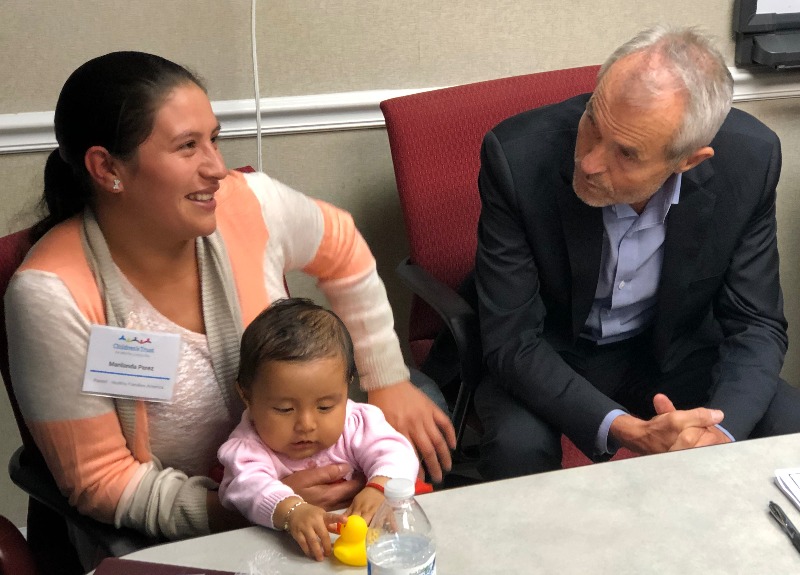
Jerry Milner of the Children’s Bureau converses with parent Marilanda Perez (l) and young Linsy.
NORTH CHARLESTON – A group of families and child-serving professionals sat together at a table in a small conference room at the University Pediatrics – Northwoods, part of the MUSC Children’s Health system, to talk about their experiences in home visiting and family strengthening programs.
Intently listening to the discussion was Jerry Milner, associate commissioner of the Children’s Bureau, an Office of the Administration for Children and Families in Washington, D.C. Joined by David Kelly, a special assistant and attorney in the Children’s Bureau, Milner is on a mission to hear directly from families who are receiving community-based prevention services.
As a Latina mom relayed her impressions of what home visiting meant to her, Milner nodded appreciatively. Just before he was going to be given a Spanish-to-English translation of her comments, he jumped in with a response in fluent Spanish. Putting parents, caregivers, and children at ease is what he does as he travels the country interacting with those who provide programs and support.
Milner, a former social services case worker and director of the state child welfare agency in Alabama, wants to ensure that prevention services services are improving the health, well-being, safety and permanency of families in every state.
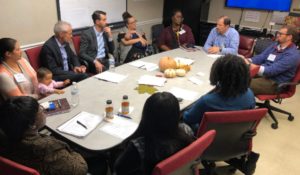
Families and program providers received the opportunity to give feedback at a discussion with Children’s Trust and the Children’s Bureau.
“The biggest takeaway for us is what they experience. If we want to change outcomes in the field that we work in, in child welfare, the experience has to be different from what it’s traditionally been,” Milner said. “That’s what we’re trying to get at here, how your experience in this program is changing life for you, making it better, not making it better, whatever it is. We need to understand that experience because that’s the real metric that we’re trying to get at by changing that experience for the better.”
Lee Porter, chief program officer for Children’s Trust, watched with appreciation as Milner, who holds a doctorate in social work, interacted with the half-dozen families and handful of home visitors and pediatricians.
“Dr. Milner brought attention to the connection between primary prevention approaches and respect for all families who face the challenges presented by parenting,” Porter said. “During his meeting with Charleston-area families who participate in home visiting programs, he dignified the presence and culture of a number of families by speaking fluently in their language. It was inspiring to observe his interaction with these mothers and how eagerly they spoke with Dr. Milner about their experiences after they sensed his respect for them and the challenges of parenting well.”
Delivering Programs That Strengthen Families
As South Carolina’s federal grantee and lead agency for the Maternal, Infant and Early Childhood Home Visiting program, Children’s Trust supports three home visiting models – Healthy Families America, Nurse-Family Partnership, and Parents as Teachers – in partnership with 17 implementing agencies – including MUSC Children’s Health and S.C. Department of Environmental Control in the Lowcountry – in 41 counties. These evidence-based, voluntary program models serve at-risk, low-income mothers and children by providing them with important resources and skills.
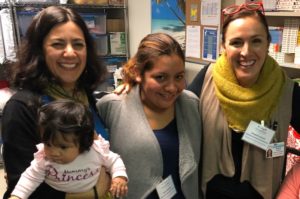
Leticia Urroz (l) and Margarita Schmid (r) of MUSC Children’s Health stand with parent Alicia Velasquez and daughter Joy Gabriela.
Home visitors support preventive health and prenatal practices, help parents understand developmental milestones, promote the use of positive parenting techniques, and work with mothers to set goals for the future, continue their education, and find employment and child care solutions. Several of the mothers in the roundtable discussion spoke to the differences that home visitors – who can be nurses, social workers or child development specialists – have made in their lives.
Alicia Velasquez said the program “provided support and strengthened my knowledge as a mother.” Ashaki Hibbert said her home visitor “was just so nice that it was like I had known her my whole life.” And Caitlyn Santiago stated that he home visitor “helped me open up. She makes things easy for me to understand.”
Margarita Schmid, a home visitor with MUSC Children’s Health, which implements the Healthy Families America model, called the relationships with the 10 families that she serves a special bond.
“We come into their homes as partners. This is a strengths-based program,” Schmid said. “We learn from each other.”
Children’s Trust also administers the evidence-based Strengthening Families Program (SFP), which focuses primarily on families with children ages 6 to 11, with 20 local partners in 24 counties across the state through funding from The Duke Endowment and the S.C. Department of Social Services.
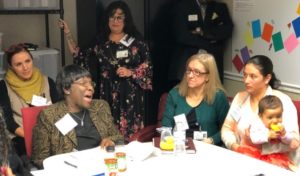
Columbus President (second from left) tells the story of how her family was strengthened.
Columbus President, a 70-year-old grandmother, went through the 14-session program with daughter Selena Estus and granddaughter Yuriel, at a site run by CASA Family Systems, a nonprofit serving Bamberg, Calhoun and Orangeburg counties. President gave an impassioned speech on the ways that SFP helps families, especially those with single parents, as they learned the value of respect, how to give rewards, how to set limits, how to build better relationships, how to address difficult behavior in a positive manner, and how to manage stress.
“My heart was very touched,” President said.
All of Us Must Play a Role
Milner smiled as he heard President’s words that perfectly encapsulated how important it is for every entity to act in concert to reach families. Federal funding comes to statewide organizations like Children’s Trust, which ensures that its local partners are delivering programs with fidelity and accountability.
“One of our key messages is there’s not one organization, one agency, that can transform a child welfare or child well-being system alone,” Milner said. “The ability to bring people together with a common vision and a joint ownership of what we’re trying to achieve is absolutely essential. So many different groups or organizations affect the lives of children every single day. That needs to be coordinated. That needs to be organized and needs to be mobilized under a belief that we have a collective responsibility to children and families.”
Eric Bellamy, director of program integration at Children’s Trust, said that’s exactly what the organization is looking to accomplish across South Carolina.
“Children’s Trust continues to seek efficient and practical means to innovatively serve the most at-risk populations, families and communities,” Bellamy said. “The strengths-based strategies of holistically supporting families through the intervention of home visiting and building stronger parenting skills and stronger families through SFP is key to primary prevention efforts that we target. Very much like the Administration for Children and Families and the Health Resources and Services Administration, we look to support these efforts at all levels of need.”
Sharing Stories of Success Make a “Good Day”
Milner added that he gives speeches to different organizations every week, and he loves to share what he has learned on these visits, whether it’s the story of a mom telling him how a particular program has helped her build parenting capacities or it’s a young person who tells him about staying out of trouble thanks to a program.
“It’s those stories, their voices, that people need to hear,” he said.
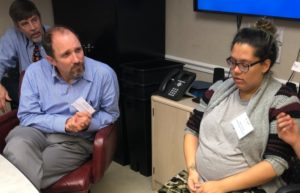
Lee Porter of Children’s Trust (l) and Henry Lemon of MUSC Children’s Health listen to Caitlyn Santiago (r) discuss her home visiting experience.
Henry Lemon, a pediatrician and medical director of MUSC Children’s Health University Pediatrics, noted the need for ambulatory and emergency care has been reduced in his area since MIECHV funding launched the home visiting program. He also believes this practice, which is providing crucial assistance for underserved Latino families with limited to access to pediatric care in North Charleston, has helped these families feel more connected and less socially isolated in their community while making the parents more confident about raising children.
After Lemon listened to the exchanges between Milner, Children’s Trust, the home visitors and the families, he came away with a better view of how everything fits into a larger picture.
“This (discussion) kind of re-inspired me for making this program work a little better, understanding how the families have been impacted, because in the day-to-day operations, we sometimes get lost in reporting metrics and fidelity,” Lemon said. “But this was a good day.”






